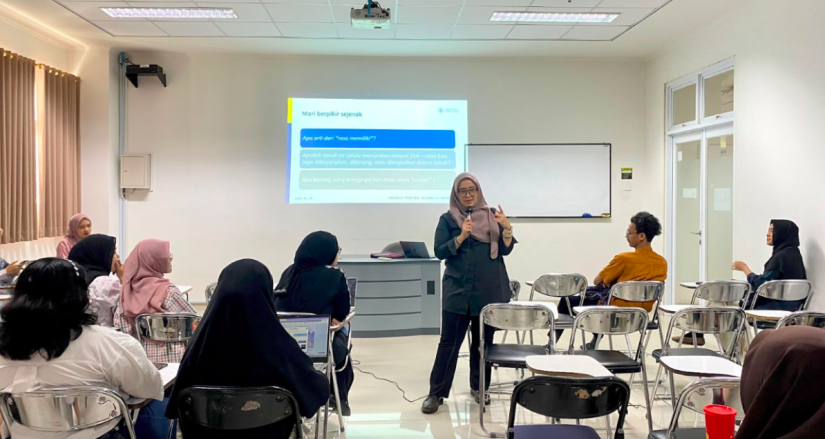
Yogyakarta, 23/4/2025 – The Master’s Program in Literature at Universitas Gadjah Mada organized a public lecture entitled “Beyond Borders: Rethinking Homeland and Belonging in Diaspora and Francophone Studies” on Tuesday, April 23, 2025, in the Soegondo Hall of the Faculty of Cultural Sciences, Universitas Gadjah Mada. The event, attended by students from various departments, was officially opened by the Head of the Master’s Program in Literature, Prof. Dr. Aprinus Salam, M.Hum. In his welcoming remarks, Prof. Aprinus Salam emphasized that public lectures are a concrete manifestation of the Tri Dharma Perguruan Tinggi. He underlined the importance of broadening international perspectives, “Although our focus is in literature from a particular country, global awareness remains an essential asset. Therefore, our program will continue to present lectures on cutting-edge literary topics from around the world.” he said.
The main material was delivered by Dr. Arifah Arum Candra Hayuningsih, S.S., M.A., who invited students to reassess conventional understandings of homeland and belonging within the context of diaspora and Francophone studies. The lecture raised fundamental philosophical and political questions, What does “home” mean? And must identity always be rooted in a specific place?
Dr. Arifah Arum highlighted that the theories of homeland and belonging are often understood in rigid terms–in terms of citizenship, territory, or national identity–whereas diasporic experiences show that identities are fluid, negotiated, and shaped by memory, language, and the legacies of colonialism. This lecture dissects important thoughts in diaspora studies from various scholars such as Paul Gilroy to Stuart Hall. Furthermore, Dr. Arifah Arum presented an analysis of Francophone literary works such as those by Leïla Sebbar, Maryse Condé, and Mariama Ba, which showed how experiences of migration and colonialism gave birth to plural creole identities. Francophone diasporic literature, according to her, is an important medium to reveal experiences that are often excluded from the dominant national narrative.
In the Q&A session, students were actively involved in raising personal and political issues around multiple identities, repatriation, and the meaning of ‘second home’. In responding to the issue of multiple identities, Dr. Arifah Arum argued that “what makes us who we are today is not a single thing. There are always broken fragments in shaping our identity. Our identities will continue to change and reproduce.” she explained. Then, she emphasized the importance of language, memory, and representation as a bridge to build an authentic sense of existence.
At the end of the session, participants were invited to reflect, could ‘homeland’ be plural, emotional, even imaginary? And how does literature play a role in shaping and re-questioning the meaning of home, identity and existence? This public lecture marks the importance of cross-cultural studies in understanding the dynamics of global identity. Not only did it enrich students’ academic insights, it also underscored the relevance of sustainable development values.
[Public Relation Magister of Literature, Marsya Kamila]

